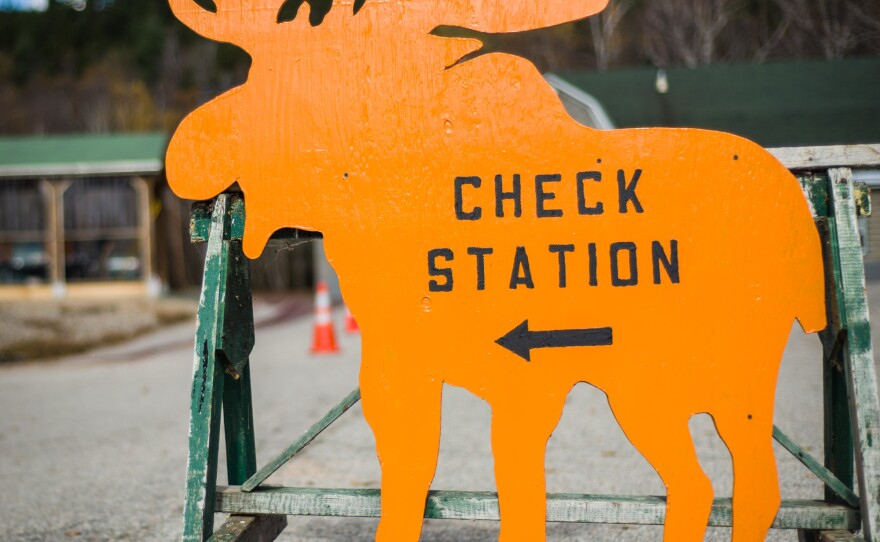This week marks both the beginning and end of moose hunting season. The prospect of bagging the New Hampshire icon draws thousands of hunters from around the country, but a limited number of permits mean only a small percentage ever get a moose in their sights.
Hunter Larry Graham spent the last month searching for the perfect place near Dummer Pond to be for the opening day of moose hunting season.
“I’d been scouting that area and there was a moose trail where they’d been coming out and we just set up and watched it and out they came.”
Graham lives in Washington, New Hampshire, 150 miles south, but he shot the cow near Dummer Pond, 25 miles to the north.
“I’d been scouting that area and there was a moose trail where they’d been coming out and we just set up and watched it and out they came.”
Graham bagged a female moose. And now he’s watching state workers check her over at one of the state’s seven moose check stations that pop up around the state this week.
A team of wildlife biologists and volunteers bind the feet of a dead female, called a cow, at an inspection station in Berlin.
The station team hoists her in the air using a power winch so they can weigh her and look at her teeth. They can tell her age by how worn the enamel is. They also inspect her ovaries, draw blood and check her for ticks.
Graham, like many hunters, waited a long time for a chance at a moose.
“It took 12 years to get drawn.”
The state awards moose permits through a lottery. It receives more than 13,000 applications. This year the state issued 275 permits. That’s 2 percent, and the number’s declining.
“They’re down about 90 permits from last year, and there are two reasons for that.”
Katherine Rines is a wildlife biologist for the Department of Fish and Game.
“Number one we reached our population objective for moose in a couple of our regions. People had wanted to see fewer moose, so we were reducing the population. In addition we’re starting to see increased mortality from winter tick.”
Winter ticks usually suck the blood from deer further south, but warmer winters have enabled them to migrate north. Now they have reached moose country, and they are proving fatal. Enough ticks can bleed a moose to death.
The situation has become a concern for biologists, so volunteers bring combs to the inspection stations and count the number of ticks they see. 70 percent of permit holders get a moose, so the information provides wildlife managers valuable data.
The station also provides good entertainment. More than a dozen people watch as the team probes a bull shot in nearby Jericho State Park
New Jersey resident Jim Catanzaro didn’t have time to scout the area himself, so he hired a guide.
“I don’t know where I was. All I know is I got up, got breakfast, and we went in the woods and got a moose.”
Not just any moose. Catanzaro’s bull’s antlers measure almost four feet from one end to the other.
“I think it was 47.5.”
Guide: “We had 47.5. I don’t know what the weight is. Do we have the weight?! (Pause) How much? 750.”
Catanzaro: “You said 700.”
Guide: “Yep. That’s a decent size bull.”
Catanzaro’s guide, Gerry Marcou is the sheriff of Coös County 51 weeks a year.
But each moose season he takes off his uniform in exchange for camouflage. Every year of the last five he’s led his clients to a moose. His secret? Pre-planning.
“It’s doing your homework, like anything else. Doing your homework, go out there and scout, find out where they are. Once you do that, you know, first day comes along you go back out there, you know where they are. So it’s like anything else, you’ve got to do your homework.”
Rines agrees.
“The important thing is to understand the species itself and to know where they’re going to be.”
That, and knowing what to do with it once you get it home.
“Oh, I like any kind of moose. If you have a nice tenderloin on the grill it is marvelous.”







